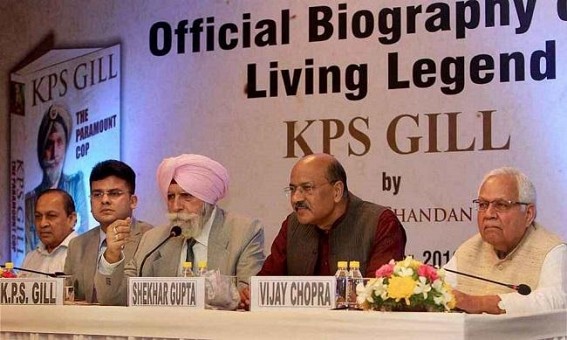Rupesh Dutta

PHOTO : TIWN /IANS
Former Punjab Director General of police K.P.S Gill has cautioned that the northeastern part of the country will see more violent attacks unless the government "acts more harshly against armed outfits".
The eighty-one-year-old retired Indian Police Services (IPS) officer, who served in the northeast for 28 years, said that whatever was happening in the region was a result of the failed negotiations in the past few decades.
He said all recent militant attacks on the Army were due to the failed efforts at building peace in the region. "The government has never been serious about solving the issue, which makes it clear that the region may see more militant attacks," Gill, who is credited with ending the Punjab militancy of the 1980s, told IANS.
India's northeast has witnessed numerous attacks on the Army by militants groups - the recent being on Assam Rifles in Arunachal Pradesh on Sunday. The attack followed three days after 20 soldiers of the Dogra regiment were killed in a ambush in Manipur, believed to be the biggest attack in the region in the past three decades. Earlier, eight soldiers of Assam Rifles were killed on March 3 in Mon district of Nagaland.
The National Socialist Council of Nagaland-K (NSCN-K), a militant group, led by S.S. Khaplang has claimed responsibility for all the attacks. Khaplang is also the chairman of the newly-formed umbrella group known as United Liberation Front of West South East Asia (UNLFW) comprising four other militant groups in the region, including United Liberation Front of Assam - Independent (ULFA-I).
He stressed that revoking the Armed Forces Special Powers Act (AFPSA) from the region was not the answer. "Repealing AFSPA would make the situation worse as there is no control on the militant groups. The governments should not just rely on the peace process. Rather it should give retaliate strongly against the militant groups who have been aiming violence against the Army," said Gill.
He also said that only the political orientation of the militant groups was the solution to bring down militancy in the states of the Northeast region.
Asked if India should take a strong stand against Myanmar for not cooperating to resolve the militancy issues as most of them have set up camps in Myanmar, Gill said, "A harsh decision against a neighbouring country won't help. Rather India should act in tandem with Myanmar."
According to the government, militant groups such as NSCN-K, United Liberation Font of Assam (ULFA-Independent) and National Democratic Front of Bodoland (NDFB) and several others have set up their camps in the bordering areas of Myanmar, Bangladesh and China with whom the Indian government had negotiated several times.
Relations between the militant groups and the neighbouring nations have flourished in the recent years with NSCN-K signing a pact with the Myanmar government that paved the way for autonomy to the NSCN-K in Sagaing - a northwestern administrative region of Myanmar.
Khaplang, who is by birth a Burmese Naga had abrogated the 15-year-old ceasefire with the Indian government in March this year. The government does not hold peace negotiations with him or his militant group because of his origin and the fact that NSCN-K camps have been set up in Myanmar.
- PM Modi's spectacular performance in India's By-Polls
- BJP-RSS want to destroy India's democratic structure: Rahul
- Kuldeep will be India's No.1 spinner going forward: Harbhajan Singh
- 2002 Gujarat riots: Despite request to CM Modi, Army lost a crucial day waiting for vehicles : Retd. Lt. General
- Progress of nation more important than debates: Kamal Haasan



